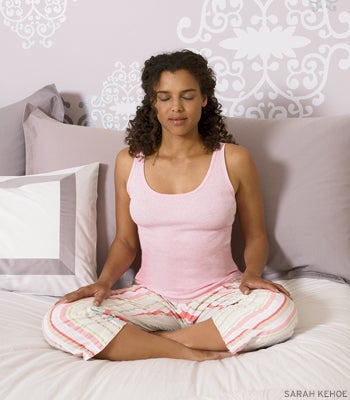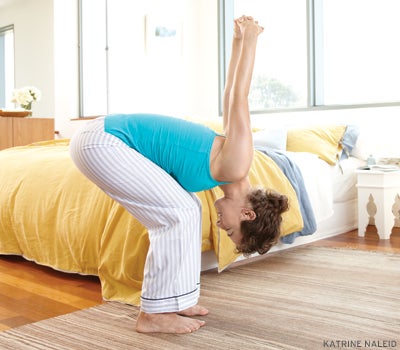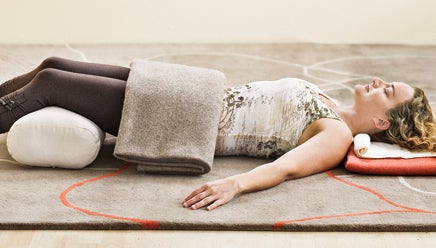Heading out the door? Read this article on the new Outside+ app available now on iOS devices for members! Download the app.
From simple lifestyle changes to breathing techniques and relaxing poses, these tips can help you sleep soundly.
1. Create a Bedtime Routine

Create a bedtime ritual to signal to your body and mind that all activity is done for the day and it’s time for rest. Any food, sensory stimulation, or even thoughts you take in must be digested and absorbed before you will be free to rest. Finish eating two hours prior to bedtime, and turn off the TV or put aside your cell phone and laptop at least a half an hour before retiring.
2. Snuggle Up and Get Warm

At bedtime, you should feel snug as a bug in a rug. Make sure to stay warm at night to relax tense muscles, which creates a more peaceful sleep. If you’re feeling cool, drink a warm cup of herbal tea or take a bath based on your body type. And remember to stay toasty when practicing passive yoga poses: Have a blanket, socks, and a sweater nearby.
3. Meditate

Meditation is a helpful tool in combating sleep disturbances. A recent study found that just two months of regular meditation practice can improve sleep time and sleep quality. Try meditating for ten minutes right before bed to induce the passive state that is necessary for sleep. Remember, even one breath is better than not meditating at all.
4. Massage Tight Muscles

A soothing massage releases muscular tension and helps the transition to bed. Abhyanga, an Ayurvedic self-massage technique can be done each morning during the fall and winter months to balance vata dosha and to keep your skin moisturized. Try rubbing your head, neck, face, and arms with warm, unfiltered organic sesame oil. You can also include someone in your ritual by asking them for a yawn-inducing rubdown: The spine from the neck downward should be stroked for about five minutes with a gentle touch.
5. Tuck Yourself in Early

Eight hours has long been considered the ideal sleep length, but it’s also important to note whenyou go to bed and wake up. According to Ayurveda, our bodies naturally want to arise around 5 am. So, if you go to bed at midnight and wake up at 8 am (a lazy kapha hour) you’ll probably still feel groggy. But if you hit the pillow before 10 pm and arise before 6 am (during lively vata time), you’ll likely feel refreshed. Ideally, you should start your bedtime rituals during the slow kapha hours of 6 to 10 pm in the evening and head for bed before 10 pm when the fiery pitta time begins.
Vata time: Between 2 and 6 in the morning and afternoon.
Pitta time: Between 10 and 2 at midday and nighttime.
Kapha time: Between 6 and 10 in the morning and evening.
See alsoDiscover the Peaceful Practice of Yoga Nidra
6. Keep a Journal

When it’s time to go to sleep, do you start replaying the day’s events or think of what you need to do in the morning? A great evening ritual is putting your thoughts on paper: Write down the contents of your mind to get all of your worries out before your head hits the pillow.
7. Stretch and Yawn

Simple moves can make all the difference. Try this stretching and yawning sequence for an easy nighttime relaxer:
Resting on your back, stretch your muscles from head to toe. Flex your feet, spread your toes, and then curl them under three times. Stretch out one foot with the opposite arm overhead. Gently squeeze and release the leg and arm muscles three times. Change sides. Hugging yourself, shrug your shoulders toward each other. Hold for three seconds and release. Change the cross of your arms and repeat.
Next, rest the base of your palms above your eyebrows with thumbs on the temples. Slide your fingertips along your hairline and circle the thumbs lightly on your temples. Yawn three times.
8. Practice Pranayama

If you’re prone to insomnia, make sure you’re deeply breathing on and off the mat. Steer away from energizing practices such as Kapalabhati (Skull Shining Breath) and instead choose calming ones like Nadi Shodhana (alternate-nostril breathing). Exhale twice as long as you inhale, which slows down the heartbeat and induces rest.
9. Fold Forward

This variation of Ragdoll (Ardha Utkatasana) helps release tension in the back, shoulders, and neck. Help rid you body of build-up toxins and anxieties with a soothing yoga practice before bedtime.
10. Take Herbal Supplements

Recent research has shown that certain herbs have a calming effect, and they may help with insomnia. Talk with your doctor before you take any herb or supplement for sleep.
Lavender: Add a few drops of lavender essential oil to a hot bath and soak right before bed to calm your mind and body.
Valerian: Try a liquid extract of this sedative herb. Follow the dosage suggested on the bottle. It can take a few weeks to take effect.
Passionflower: Drink a tea infused with soothing passionflower.
11. Relax with Yoga Nidra

Yoga nidra is a systematic form of guided relaxation that typically is done for 35 to 40 minutes at a time. Practitioners say that it often brings immediate physical benefits, such as reduced stress and better sleep, and that it has the potential to heal psychological wounds. As a meditation practice, it can engender a profound sense of joy and well-being.